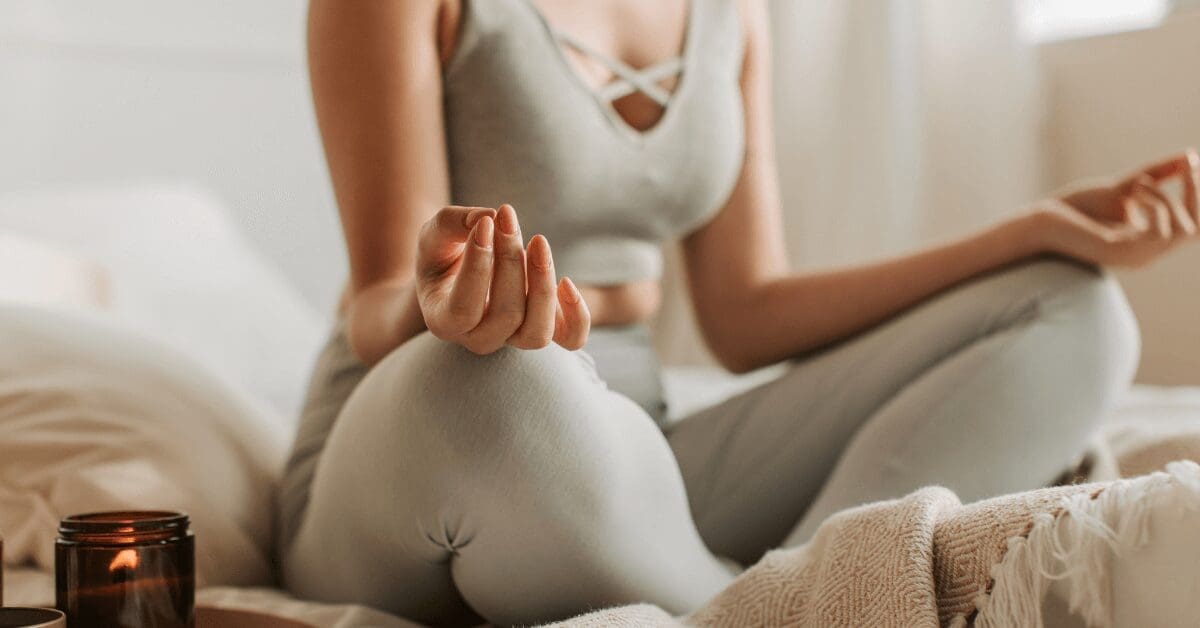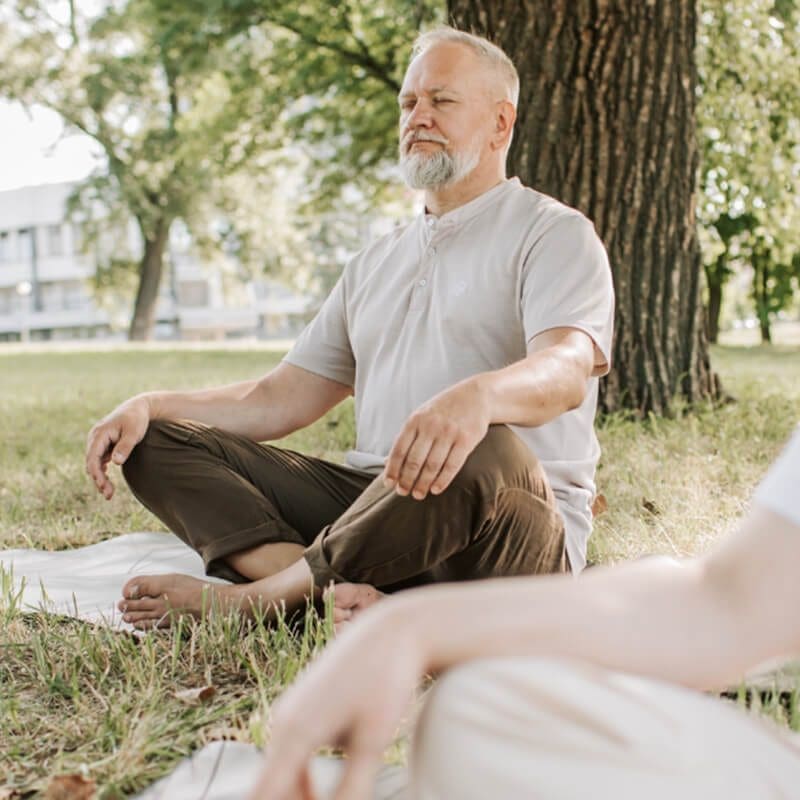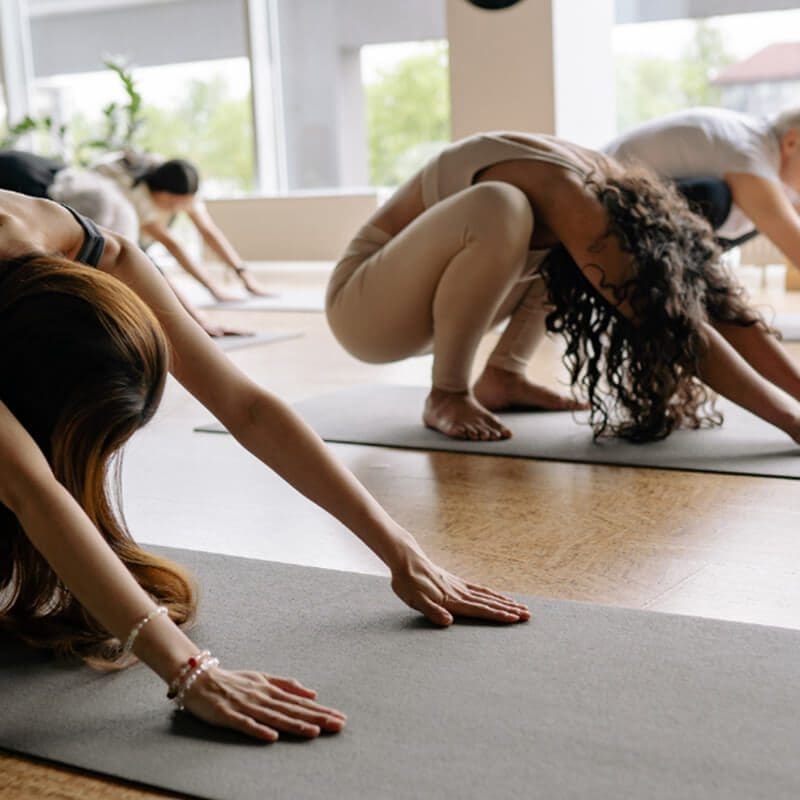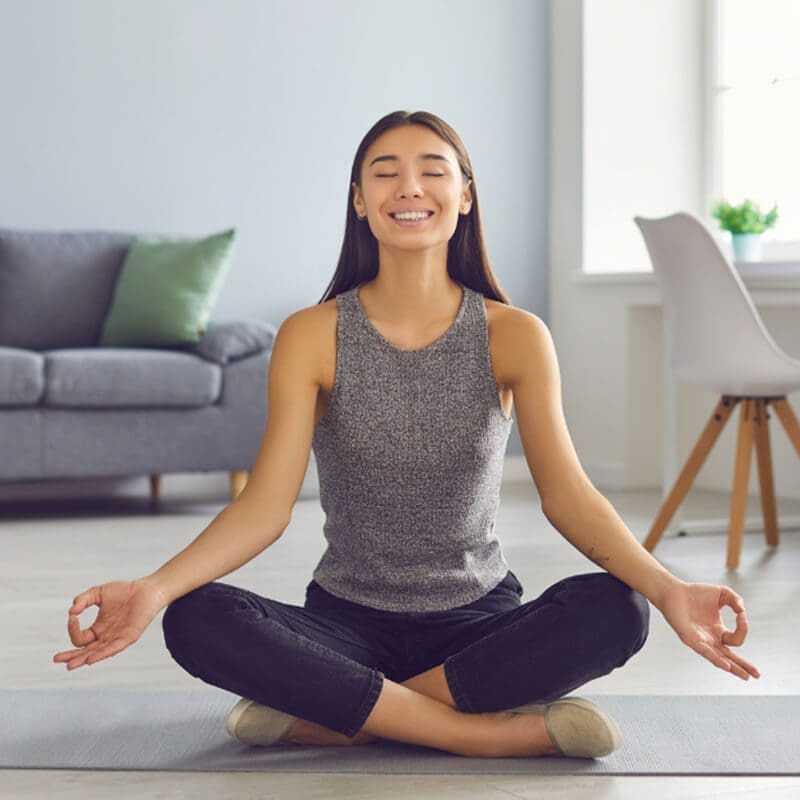
How Yoga Benefits Your Mental Health
Read Time:
6.7 minutes
Share This:
Are you feeling stressed? Overwhelmed? Anxious? We can all benefit from a dose of self-care, and yoga is one of the best ways to do that. Numerous studies have proven just how effective it is in improving mental conditions like anxiety, depression, and stress.
At Grey Matters of Carmel, we love looking for other ways people can regulate their brains and their nervous systems when they’re not sitting down for a neurofeedback training session. So, let’s look at why practicing yoga regularly can improve your overall mental health and well-being.
Yoga Is a Mind-Body Practice
An important aspect of yoga is the emphasis on connecting your body, mind, and spirit. By bringing awareness to your breath, posture, and inner thoughts/feelings, you learn how to be in tune with your body. This connection helps to increase self-awareness, which can lead to improved mental health benefits and emotional well-being.
Yoga Looks Different for Everyone
You don’t have to be a yogi or master all the poses to benefit from yoga. Everyone is at a different level when it comes to their practice, and everyone will experience different benefits. The most important part is that you find what works for your body and mind and take it from there.

Yoga Can Help With Depression
Yoga has been found to be an effective tool for managing depression. According to research, experts found that people who participated in regular yoga classes experienced decreased symptoms of depression. This was due to both physical and mental effects, such as improved heart rate variability, increased energy levels, and a greater sense of self-efficacy.
Yoga Increases Self-Awareness and Mindfulness
One of the main benefits of yoga is increased self-awareness and mindfulness. Through regular practice, you learn how to observe your thoughts and emotions without judgment or attachment. This helps to reduce stress and anxiety levels as you become more aware of how your thoughts and feelings can influence your mental health.
Yoga Improves Focus and Concentration
Studies have shown that yoga can help improve focus and concentration by reducing stress and improving attention span. Regular practice of meditation, breathing exercises, and physical postures helps to create the mind-body connection that is essential for improved focus and clarity.
Yoga Helps With Stress Management
Stress can be one of the biggest mental health obstacles. Yoga is an effective way to manage it because it promotes relaxation and improves your body’s capacity to deal with stress triggers in a healthier way. It also teaches you how to be mindful of your reactions when faced with stressful situations so that you can make better decisions and keep your mind and body in check.

Yoga Can Help Reduce Anxiety
Yoga has also been found to help reduce the symptoms of anxiety, as it helps relax your body and calm your mind. Regular practice helps to increase self-awareness, which can help you become more in control of anxious thoughts and feelings. You can also learn how to be more in tune with your body and recognize the signs of an anxiety attack before it happens.

Yoga Can Help Improve Sleep Quality
Sleep is an important part of mental health, yet many people struggle to get enough of it or have difficulty sleeping restfully. In addition to the calming effects of yoga, it also helps your muscles stretch and relax. The exercise also helps tire out your body for better and deeper sleep.
Yoga Helps to Boost Self-Esteem
Practicing yoga can help to build self-confidence as it focuses on body awareness, acceptance, and positive thinking. By connecting with your body through yoga postures and breathing exercises, you can learn to appreciate who you are and become more self-accepting. This can help to improve your self-esteem, body image, and overall mental health.
Yoga Promotes Happiness
It has been proven that regular yoga practice helps to boost your mood. According to a study conducted at Harvard Medical School, regular yoga practice has been linked to increased levels of “feel-good” neurotransmitters in the brain, such as serotonin and dopamine.
Yogic breathing techniques, meditation, and physical postures also activate the parasympathetic nervous system, which is responsible for calming the body down and reducing stress response levels. This can lead to improved feelings of contentment, joy, and peace within.

How to Start Doing Yoga
Doing yoga can be an incredibly rewarding experience that not only has immediate physical benefits but long-lasting changes in your mental well-being too. Here’s how you can start.
Decide What Kind of Yoga You Want to Do
The first step is deciding which type of yoga you want to practice. There are many different types of yoga, such as Hatha, Vinyasa, and Iyengar, to name a few. Each style focuses on different aspects and goals, so it’s important to understand the differences before diving in headfirst.
For example, Hatha yoga focuses on physical postures and alignment, Vinyasa yoga emphasizes movement and breathwork, and Iyengar yoga combines poses with props to help provide support.
Find the Right Yoga Teacher and Class
Once you’ve decided which style of yoga is best for you, it’s time to find the right yoga instructors and classes. Look for teachers with experience and who have a style that suits your needs. Also, look for classes that are tailored to your level and ability. You don’t want to get too overwhelmed or bored in your first class, so make sure it’s the right fit.
Set up a Practice Space
Find an area in your home where you can set up a yoga practice space. You want to make sure it’s comfortable and free of distractions. A quiet corner or spot in your bedroom can be the perfect place for you to find some peace and relaxation while practicing yoga.
Choose the Right Props
Having the right props can help to take your meditation practices up a notch and make them more enjoyable. There are many different props to choose from, such as mats, blocks, straps, and bolsters. Consider what props you need for your particular practice and invest in quality items that will last.
Take Self-Care Seriously
Yoga is a great way to practice self-care. While yoga postures and breathing exercises can be beneficial for your physical and mental clarity, it’s important to remember that self-care also includes giving yourself time off from practice. Make sure to take breaks in between classes and give yourself some much-needed rest and feelings of relaxation.
Consider a Done-For-You Yoga Program
If you’re having trouble getting started on your own, there are many done-for-you yoga programs available. These are effective methods that can help to guide you through the different poses and breathing exercises so that you can get the most out of your practice. Having a structured exercise program with an instructor can be especially helpful for those just starting out.
Take the First Step to a Healthier Mental Health Journey With Grey Matters
Yoga is an incredibly powerful tool for managing stress, anxiety symptoms, and depression and improving overall mental health. Practicing yoga regularly, along with neurofeedback training, can help to reduce the symptoms of mental illness and give you a sense of calmness and peace. Our founder, Courtney, really likes practicing hot yoga with her friends at Carmel’s Sol Hot Yoga Studio – check them out!
You won’t find yoga classes at our clinic (yet), but if you’re looking for an experienced and compassionate clinic to help guide your journey with mental health to address the symptoms fast, look no further than Grey Matters of Carmel. We are a dedicated team of healthcare professionals want to see you succeed in your healing journey.
So, contact us today to learn more about our services and how we can help you reach your mental health goals.



